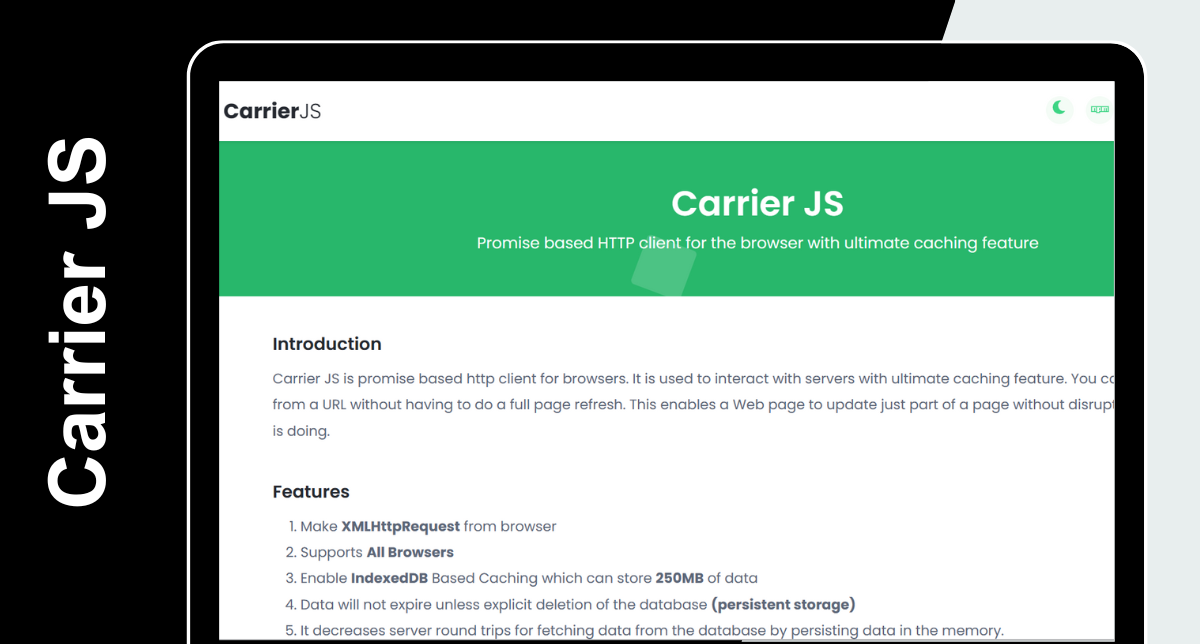Carrier JS is a robust caching-based HTTP client tailored for web browsers. Its primary purpose is to optimize the handling of API requests by intelligently caching frequently accessed data at multiple points along the request-response path. By doing so, Carrier JS minimizes redundant server requests, delivering cached responses for common requests and facilitating quick and cost-effective access to data.
Application Type
JavaScript Library
Stack
Javascript
HTTP Protocol
Caching
IndexedDB
XML
NPM
Github
Code
Live
Project Purpose and Goal
Carrier JS aims to optimize web applications by intelligently
caching frequently accessed data, reducing redundant
API requests, and enhancing overall performance. The project addresses
challenges related to duplicate API requests in
scalable applications to contribute to improved quality of service in
web development.
The primary goal of Carrier JS is to provide developers with a reliable
and efficient HTTP client for browsers. Leveraging
caching mechanisms, including features like
IndexedDB-based storage, the library aims to minimize
server load, bandwidth consumption,
and latency. It strives to streamline the handling of
API requests, delivering a seamless and responsive user
experience.
Through cross-browser compatibility and
IndexedDB-based storage, Carrier JS offers a valuable
tool for developers seeking to optimize web applications and improve
data retrieval efficiency.
Problems And Thought Process
Challenges Faced: The development of Carrier JS was prompted by the prevalent challenges of duplicate API requests in scalable web applications. These duplicates posed issues such as increased server load, heightened bandwidth consumption, and potential performance bottlenecks.
Thought Process: The thought process behind Carrier JS revolved around creating a solution that would intelligently cache frequently accessed data, thereby reducing the need for redundant API requests. The goal was to provide developers with a reliable and efficient HTTP client tailored for browsers, equipped with robust caching mechanisms to enhance overall performance.
Optimizing Data Retrieval: The project's focus was on streamlining the handling of API requests by leveraging features like IndexedDB-based storage. This approach aimed to minimize latency, server load, and bandwidth consumption, contributing to a seamless and responsive user experience.
Addressing Scalability: Carrier JS was envisioned to address the scalability concerns of web applications, ensuring that quality of service is maintained even in scenarios involving rapid and multiple API calls. By providing control over data freshness and implementing an efficient caching feature, the project aimed to strike a balance between performance optimization and accurate data retrieval.
Demo
Tech Stack Explanation
Frontend Library: Carrier JS is primarily a frontend library designed for web browsers. It leverages JavaScript to interact with browser APIs and manage HTTP requests efficiently. The use of JavaScript ensures compatibility with various browsers, allowing developers to integrate Carrier JS seamlessly into their web applications.
IndexedDB: The library utilizes IndexedDB for client-side storage. IndexedDB is a low-level API for storing large amounts of structured data, making it suitable for caching purposes. Carrier JS employs IndexedDB to persistently store cached data, with a capacity of up to 250MB, providing developers with a reliable and scalable storage solution.
HTTP Requests: Carrier JS utilizes XMLHttpRequest to make HTTP requests from the browser. This core browser feature enables the library to initiate requests, handle responses, and implement caching mechanisms. The integration of XMLHttpRequest ensures the compatibility of Carrier JS with different browsers.
Web Standards: The development of Carrier JS aligns with established web standards, including HTTP specifications such as RFC 2616 and RFC 7231. By adhering to these standards, Carrier JS ensures compatibility, reliability, and consistency in its interactions with web servers.
Open Source Community: Carrier JS encourages contributions from the open-source community. By fostering collaboration and engagement, the library benefits from diverse perspectives and expertise. The MIT license allows developers to use, modify, and contribute to Carrier JS, promoting a collaborative and inclusive development environment.
Lessons Learned
Building Carrier JS underscored the importance of setting incremental goals, constructing minimum viable products for iterative refinement, and continuously comparing them with the production version for efficient development. This process taught valuable lessons in adaptability and resilience in web development, shaping a skill set that anticipates applying these insights to future projects for sustained growth and innovation.
